|
(All
of the following are excerpts from "Mormon
Polygamy: A History", by LDS Author Richard S. Van Wagoner,
Chapter 9, "Women in Polygamy")
1. Did Mormon Women Really Have a Choice to Accept or
Reject Polygamy?
No,
women had no real choice, thank's to the Mormon "Law
of Sarah."
The
process for exempting a wife from the "Law of Sarah" is
outlined in the 1843 revelation on the law of polygamy in
Doctrine & Covenants 132:64-65
 64
And again, verily, verily, I say unto you, if any man have
a wife, who holds the keys of this power, and he teaches
unto her the [plural wife] law of my priesthood, as pertaining
to these things, then shall she believe and administer unto
him, or she shall be destroyed, saith the Lord your
God; for I will destroy her; for I will magnify
my name upon all those who receive and abide in my law. 64
And again, verily, verily, I say unto you, if any man have
a wife, who holds the keys of this power, and he teaches
unto her the [plural wife] law of my priesthood, as pertaining
to these things, then shall she believe and administer unto
him, or she shall be destroyed, saith the Lord your
God; for I will destroy her; for I will magnify
my name upon all those who receive and abide in my law.
65 Therefore, it shall be lawful in me, if she receive
not this law [of polygamy], for him to receive all things
whatsoever I, the Lord his God, will give unto him, because
she did not believe and administer unto him according to
my word; and she then becomes the transgressor;
and he is exempt from the law of Sarah, who administered
unto Abraham according to the law when I commanded Abraham
to take Hagar to wife.
Apostle Orson Pratt also explained this clause in the Lord's
Law of Celestial Marriage:
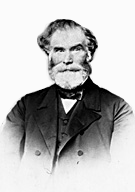 "When
a man who has a wife, teaches her the law of God, and she
refuses to give her consent for him to marry another according
to that law, then, it becomes necessary, for her to state
before the President the reasons why she withholds her consent;
if her reasons are sufficient and justifiable and the husband
is found in the fault, or in transgression, then, he is
not permitted to take any step in regard to obtaining another.
But if the wife can show no good reason why she
refuses to comply with the law which was given unto Sarah
of old, then it is lawful for her husband, if permitted
by revelation through the prophet, to be married to others
without her consent, and he will be justified, and she will
be condemned, because she did not give them unto
him, as Sarah gave Hagar to Abraham, and as Rachel and Leah
gave Bilhah and Zilpah to their husband, Jacob." (The
Seer, Vol.1, No.3, p.41) "When
a man who has a wife, teaches her the law of God, and she
refuses to give her consent for him to marry another according
to that law, then, it becomes necessary, for her to state
before the President the reasons why she withholds her consent;
if her reasons are sufficient and justifiable and the husband
is found in the fault, or in transgression, then, he is
not permitted to take any step in regard to obtaining another.
But if the wife can show no good reason why she
refuses to comply with the law which was given unto Sarah
of old, then it is lawful for her husband, if permitted
by revelation through the prophet, to be married to others
without her consent, and he will be justified, and she will
be condemned, because she did not give them unto
him, as Sarah gave Hagar to Abraham, and as Rachel and Leah
gave Bilhah and Zilpah to their husband, Jacob." (The
Seer, Vol.1, No.3, p.41)
When cross-examined during the Reed Smoot hearings, church
president Joseph F. Smith gave the official church position
on the necessity of a wife's consent to polygamy:
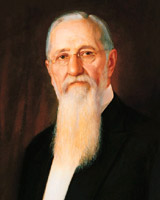 President
Smith: The condition is that if she does not consent
the Lord will destroy her, but I do not know how he will
do it. President
Smith: The condition is that if she does not consent
the Lord will destroy her, but I do not know how he will
do it.
Question: Is it not true that ... if she refuses
her consent her husband is exempt from the law which requires
her consent.
President Smith: Yes; he is exempt from
the law which requires her consent. She is commanded to
consent, but if she does not, then he is exempt from the
requirement.
Question: Then he is at liberty to proceed without
her consent, under the law. In other words, her consent
amounts to nothing?
President Smith: It amounts to nothing but her
consent.
In
1875 Apostle Wilford Woodruff announced, "We have many bishops
and elders who have but one wife.  They
are abundantly qualified to enter the higher law and take
more, but their wives will not let them. Any man
who permits a woman to lead him and bind him down is but
little account in the church and Kingdom of God." They
are abundantly qualified to enter the higher law and take
more, but their wives will not let them. Any man
who permits a woman to lead him and bind him down is but
little account in the church and Kingdom of God."
Brigham Young declared "Let the father be the head of the
family … and let the wives and the children say
amen to what he says, and be subject to his dictates,
instead of their dictating the man, instead of trying to
govern him."
2.
Women Felt Obligated to Accept Polygamy
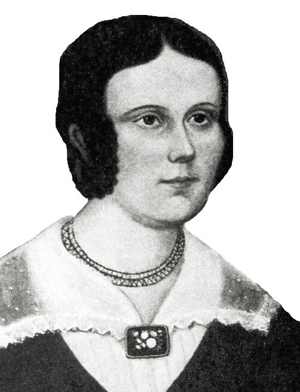 "Many
may think it very strange that I would consent for my dear
husband, whom I loved as I did my own life and lived with
him for years, to take more wives," wrote Sarah D. Rich,
wife of Apostle Charles C. Rich. "This I could not have
done if I had not believed it to be right in the Sight of
god, and believed it to be one principal of his gospel once
again restored to earth, that those holding the priesthood
of heaven might by obeying this order attain to a higher
glory in the eternal world." (spelling corrected) "Many
may think it very strange that I would consent for my dear
husband, whom I loved as I did my own life and lived with
him for years, to take more wives," wrote Sarah D. Rich,
wife of Apostle Charles C. Rich. "This I could not have
done if I had not believed it to be right in the Sight of
god, and believed it to be one principal of his gospel once
again restored to earth, that those holding the priesthood
of heaven might by obeying this order attain to a higher
glory in the eternal world." (spelling corrected)
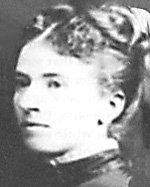 Annie
Clark Tanner was similarly certain that "women would never
have accepted polygamy had it not been for their religion.
The principle of Celestial Marriage was considered the capstone
of the Mormon religion. Only by practicing it would the
highest exaltation in the Celestial Kingdom of God be obtained." Annie
Clark Tanner was similarly certain that "women would never
have accepted polygamy had it not been for their religion.
The principle of Celestial Marriage was considered the capstone
of the Mormon religion. Only by practicing it would the
highest exaltation in the Celestial Kingdom of God be obtained."
George S. Tanner, prominent Utah educator and polygamous
son, reasoned: "I doubt there was a woman in the church
who was in any way connected with Polygamy who was not heartsick.
They would not admit it in public because of their loyalty
to the church and their brothers and sisters." Tanner was
persuaded that "the women try to be brave, but no woman
is able to share a husband whom she loves with one or more
other women. Only a few of the women involved in polygamy
asked for a divorce simply because it was not a popular
thing to do."
Mrs. Hubert Howe Bancroft, a prominent visitor to Salt Lake
City in 1880, commented on the ability of polygamous women
to maintain appearances. She observed that Mormon women
viewed polygamy as "a religious duty and schooled themselves
to bear its discomforts as a sort of religious penance,
and that it was a matter of pride to make everybody believe
they lived happily and to persuade themselves and others
that it was not a trial; and that long life of such discipline
makes the trial lighter."
3. What Mormon Women Really
Felt About Polygamy
Phebe Woodruff
Phebe Woodruff, first wife of Apostle Wilford Woodruff,
also shared the ambivalent feelings of Mormon women in polygamy.
Called upon to defend the principle in a mass meeting of
Mormon women, Phebe bore testimony that "If I am proud of
anything in this world, it is that I accepted the principle
of plural marriage, and remained among the people called
'Mormons' and am numbered with them to-day." A few days
later in a conversation with a long-time friend she was
asked, "How is it Sister Woodruff that you have changed
your views so suddenly about polygamy? I thought you hated
and loathed the institution." "I have not changed," was
her response: "I loathe the unclean thing with all the strength
of my nature, but Sister, I have suffered all that a woman
can endure. I am old and helpless, and would rather stand
up anywhere, and say anything commanded of me, than to be
turned out of my home in my old age which I should be most
assuredly if I refused to obey counsel."
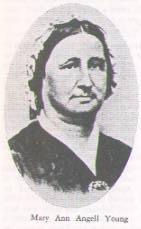 Mary
Ann Angell Young Mary
Ann Angell Young
Mary Ann Angell Young, Brigham Young's second wife, was
a patient, uncomplaining woman. But even she reportedly
remarked to a friend, "God will be very cruel if he does
not give us poor women adequate compensation for the trials
we have endured in polygamy."
The highly favored Emmeline Free Young experienced, as Mary
Ann put it, "the torments of the damned" over being displaced
by Brigham's younger wife, Amelia Folsom. When a friend
asked one of Mary Ann's daughters if it did not grieve her
mother to see Young's devotion to his new wife, she replied,
"Mother does not care. She is past being grieved by his
conduct, but, on the other hand, it gives her most intense
satisfaction to see Emmeline suffer as she does. She can
understand now what mother had to undergo in past years.
In fact, all the women are glad that Emmeline is getting
her turn at last."
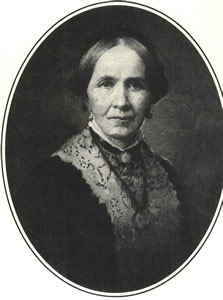 Zina
D. Jacobs Smith Young Zina
D. Jacobs Smith Young
When a woman whose husband had taken a second wife went
to Zina in great anguish of mind to ask, "Does the fault
lie in myself that I am so miserable; or is the system to
blame for it?" Zina reportedly replied, "Sister, you are
not to blame, neither are you the only woman who is suffering
torments on account of polygamy. There are women in this
very house [Brigham Young's] whose hearts are full of hell,
and in that room … is a woman who has been a perfect fury
ever since Brother Young married Sister Amelia Folsom. Brigham
Young dare not enter that room or she would tear his eyes
out. It is the system that is to blame for it, but we must
try and be as patient as we can."
Zina was quoted in the 19 November 1869 New York World.
"They expect too much attention from the husband, and because
they do not get it, or see a little attention bestowed upon
one of the other wives, they become sullen and morose, and
permit their ill-temper to finally find vent." Zina felt
that "a successful polygamous wife must regard her husband
with indifference, and with no other feeling than that of
reverence, for love we regard as a false sentiment; a feeling
which should have no existence in polygamy."
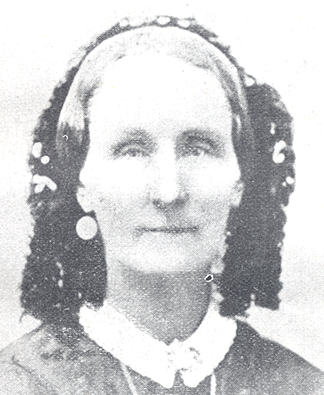 Vilate
Kimball Vilate
Kimball
Vilate Kimball, first wife of Heber C. Kimball, also recognized
the value of romantic distance in a plural marriage. Counseling
an unhappy plural wife, she advised the woman that "her
comfort must be wholly in her children; that she must lay
aside wholly all interest or thought in what her husband
was doing while he was away from her" and be as "pleased
to see him when he came in as she was pleased to see any
friend."
Sarah Pratt
Sarah Pratt insisted that the first wife "should be it,
and resented her husband's affections toward his other wives.
Being away from home on church assignment was a hallmark
of dedication for Mormon males, and during the years 1839-68,
Orson Pratt was absent from his home for a total of nearly
eleven years. Thirteen children were born during this period.
Death took many, and other hands than Orson's usually buried
them.
Ultimately Pratt's preoccupation with church work and his
habit of marrying much younger women dealt a fatal blow
to his relationship with Sarah. After returning from England
in early 1868, the fifty-seven-year-old man began courting
a sixteen-year-old girl who would become his tenth wife
on 28 December 1868. At fifty-one, Sarah could no longer
bear children, and she had come to resent bitterly Pratt's
relationships with women younger than their oldest daughter.
In an 1877 interview she lashed out at him. "Here was my
husband," she said, "gray headed, taking to his bed young
girls in mockery of marriage. Of course there could be no
joy for him in such an intercourse except the indulgence
of his fanaticism and of something else, perhaps, which
I hesitate to mention."
Sarah castigated polygamy as the "direst curse with which
a people or a nation could be afflicted. It completely demoralizes
good men, and makes bad men correspondingly worse. As for
the women—well, God help them! First wives it renders desperate,
or else heart-broken, mean-spirited creatures; and it almost
unsexes some of the other women, but not all of them, for
plural wives have their sorrows too."
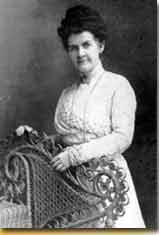 Martha
Hughes Cannon Martha
Hughes Cannon
Dr. Martha Hughes Cannon, twenty-seven-year-old resident
physician at Deseret Hospital in Salt Lake City and later
the first female state senator in the United States, became
the third plural wife of fifty-year-old Angus Cannon, Salt
Lake City stake president and one of Deseret Hospital's
directors. She described her polygamous marriage as "a few
stolen interviews thoroughly tinctured with the dread of
discovery." In a 3 February 1888 letter to her husband while
she was in Europe, she wrote that the trials of polygamy
would be unendurable without "a thorough knowledge from
God, that the principle for which we are battling and striving
to maintain in purity upon the earth is ordained by Him,
and that we are chosen instruments in His hands to engage
in so great a calling." She added that "even with this assurance
grounded in one's heart, we do not escape trials and temptations,
grievious at times in their nature."
Martha was acquainted with several monogamous families and
yearned for an exclusive relationship. She described such
a marriage as "a joy and comfort to witness, where the wife
and Mother is proud and happy in the devotion of a noble
husband, while he in turn is equally contented and happy
in the possession of the partner he has chosen for life;
while at home in each other's association is where their
greatest joys are centered." "Oh for a home!" she lamented
in a 30 December 1891 letter to Angus: "A husband of my
own because he is my own. A father for my children whom
they know by association. And all the little auxiliaries
that make life worth living. Will they ever be enjoyed by
this storm-tossed exile. Or must life thus drift on and
one more victim swell the ranks of the great unsatisfied!"
Martha wrote her polygamous husband: "How do you think I
feel when I meet you driving another plural wife about in
a glittering carriage in broad day light? I am entirely
out of money—borrowing to pay some old standing debts. I
want our affairs speedily and absolutely adjusted—after
all my sacrifice and loss you treat me like a dog—and parade
others before my eyes—I will not stand it."
Sadie Jacobs
"If anyone in this world thinks plural marriage is not a
trial," Sadie Jacobson said, "they are wrong. The Lord said
he would have a tried people."
Daughter of Jedediah M. Grant
"Polygamy is alright when properly carried out—on a shovel."
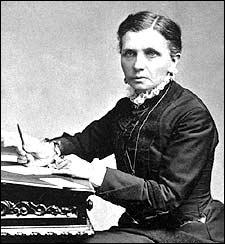 Emmeline
B. Wells Emmeline
B. Wells
Emmeline's marriage to Daniel was unhappy. "O, if my husband
could only love me even a little and not seem to be perfectly
indifferent to any sensation of that kind," she wrote in
her 30 September 1874 diary. "He cannot know the craving
of my nature; he is surrounded with love on every side,
and I am cast out.… O my poor aching heart when shall it
rest its burden only on the Lord.… Every other avenue seems
closed against me." On their twenty second wedding anniversary
she wrote in her diary, "Anniversary of my marriage with
Pres. Wells. O how happy I was then how much pleasure I
anticipated and how changed alas are things since that time,
how few thoughts I had then have ever been realized, and
how much sorrow I have known in place of the joy I looked
forward to."
(For the above references and more information on polygamy,
refer to Mormon
Polygamy: A History, by LDS Author Richard S. Van Wagoner)
For more discussion on Mormon sexuality,
see this on-line article:
Sexuality
Within The Contemporary Mormon Experience
Notice
how little Mormon apologists have to say about this great
revealed Mormon doctrine and experience:
http://www.fairlds.org/apol/ai049.html
Next:
Summary of Mormon
Polygamy Facts and Myths |